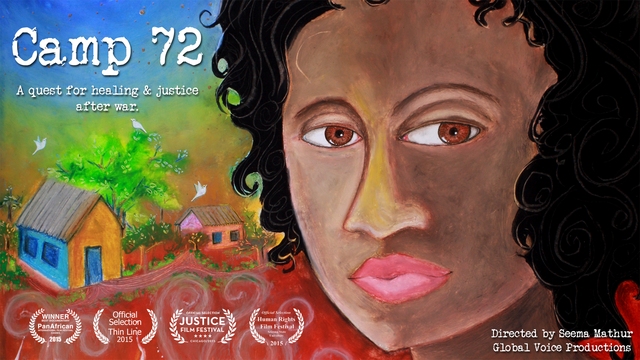A succession of devastating civil wars between 1989 and 2003 killed hundreds of thousands of Liberians. Suffering indiscriminate violence, torture, and rape, the survivors are still coming to terms with the horror they suffered. This candid film gives a voice to the survivors, who, as well as the trauma itself, describe a recovery impeded by institutional lethargy that allows brutal warlords to live freely beside the civilians they once brutalised.
Gladys Arthur, sits before the Truth and Reconciliation Commission (TRC), established in 2006 to secure justice for the war's victims. She bravely testifies:
"[It was] 1990 when Mango Menlor killed my mother, he took us with a bodyguard […] When they took us he separated us. That was the last time I ever saw my brother."
The man she mentions, Mango Menlor, was a soldier commanded by rebel leader and former Liberian president Charles Taylor. Whilst Taylor was ultimately sentenced to 50 years in prison for
"some of the most heinous and brutal crimes recorded in human history", Mango and many more of his henchmen still roam free among the people they terrorised.
The filmmakers attempt to track down general Mango, who has refused to sit before the TRC and threatened those that intend to share stories of his crimes. Whilst he remains elusive, other ex-combatants appear among the community. Joshua Blahyi, AKA General 'Butt Naked', has admitted to being responsible for 20,000 deaths during the war. This former warlord is found receiving counselling at Agnes Ummana's 'Straight From the Heart' trauma centre; the very same centre helping Gladys Arthur recover from the trauma inflicted upon her by men just like Blahyi.
In 2009 the TRC completed its work and announced measures attempting to bring justice to the victims of the war. However, there is a lack of political will to act on these resolutions, with many individuals cited in the report occupying positions in the Liberian government. As a result victims of the war are denied reparations, and continue to live in communities where the perpetrators of extreme violence and abuse move seamlessly among their victims:
"Liberia is a small country and one hundred thousand ex-combatants were disarmed, where do they live? There is no camp for ex-combatants, they live with us."
Festivals

Pan African International Film Festival – Best Documentary

Tine Line – Official Selection

Justice Film Festival – Official Selection

Human Rights Film Festival – Official Selection

San Diego Black Film Festival - Best Foreign Documentary

Amnesty International Human Rights Award

Fort Worth Indie Film Showcase - Best Documentary; Audience Choice Award, We Are All In This Together

Tryon International Film Festival - Audience Choice
 A succession of devastating civil wars between 1989 and 2003 killed hundreds of thousands of Liberians. Suffering indiscriminate violence, torture, and rape, the survivors are still coming to terms with the horror they suffered. This candid film gives a voice to the survivors, who, as well as the trauma itself, describe a recovery impeded by institutional lethargy that allows brutal warlords to live freely beside the civilians they once brutalised.
A succession of devastating civil wars between 1989 and 2003 killed hundreds of thousands of Liberians. Suffering indiscriminate violence, torture, and rape, the survivors are still coming to terms with the horror they suffered. This candid film gives a voice to the survivors, who, as well as the trauma itself, describe a recovery impeded by institutional lethargy that allows brutal warlords to live freely beside the civilians they once brutalised.
 Pan African International Film Festival – Best Documentary
Pan African International Film Festival – Best Documentary
 Tine Line – Official Selection
Tine Line – Official Selection
 Justice Film Festival – Official Selection
Justice Film Festival – Official Selection
 Human Rights Film Festival – Official Selection
Human Rights Film Festival – Official Selection
 San Diego Black Film Festival - Best Foreign Documentary
San Diego Black Film Festival - Best Foreign Documentary
 Amnesty International Human Rights Award
Amnesty International Human Rights Award
 Fort Worth Indie Film Showcase - Best Documentary; Audience Choice Award, We Are All In This Together
Fort Worth Indie Film Showcase - Best Documentary; Audience Choice Award, We Are All In This Together
 Tryon International Film Festival - Audience Choice
Tryon International Film Festival - Audience Choice





